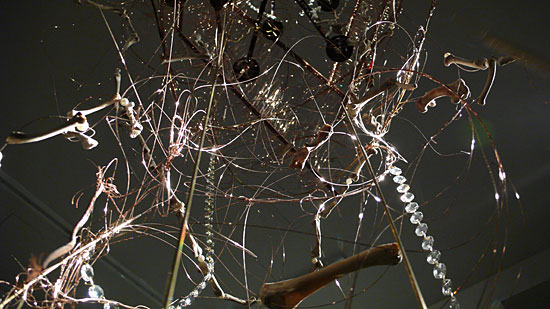NEWA
Sophie Erlund
January 17 – March 1, 2008

Berlin’s recent history is characterized by radical transformations brought on by politics, ideology, cruelty, destruction, fear and ultimately hope – an assaulting and often uncomfortable process of transformation that has left physical reminders of the various ‘Berlins’ that have been. Berlin is a monument to a plural history. With each subsequent sea change, roads are renamed, ruins are rebuilt, and materials from destroyed buildings are reassembled, unrecognizable and mute to the stories of the past.
Sophie Erlund, Berlin-based Danish artist, has been developing a practice that both dissects and celebrates the presence of past narratives in a contemporary world. For Newa, Erlund has created a sculptural installation with pieces that references and continues the history of Hotel Newa, the former Russian-owned hotel that is the current home of PROGRAM in Berlin. The gallery space, which was once the hotel’s famous restaurants, is darkened like a theater. The building’s colorful history, from its time as Hotel Nordland in the first years of the 20th century, to the pageantry of the interwar years, to the 1950s and 60s when it housed the Russian secret police, provided the material for a series of sculptures that find their origin within these histories. Archive images, interviews with previous guests of the hotel, and on site research became both the medium and material with which Erlund used to express the poetics of physically experiencing space (Gaston Bachelard), while acknowledging the constructed nature of this experience (Jeff Wall).
Erlund’s installation remixes imagery, sound, and furniture into a group of collaged situations. The exhibition is a testament to memory; not of its resilience, but of its imaginative and perhaps unreliable nature. Much of the works in Newa owe their conception to an interview Erlund conducted with Renate Bronnen, an Austrian actress that would frequent the hotel’s bar and restaurant in the 1960s with her husband whenever they were in East Germany. Today, Bronnen still recollects the lively discussions, the rooms filled with artists, the luster of smoky green upholstery, and, of course the Sekt and Russian caviar – a rarity in the austere days of East German rule.
A surreal, mismatched quality belies the belief that the attempt of any historical recall is itself, immediately, an act of distortion. The herringbone pattern of the hotel’s dining room, an area that spanned both PROGRAM’s current exhibition space and offices, is reincarnated as a color, surface treatment – a veneer of the hardwood surfaces that have absorbed the weight of more than a century of use. The grand chandeliers that once infused the GDR with the sparkle of Berlin’s more extravagant days appear now as a shadow. The ghost of a curtain appears conflated with the streets outside on a screen attached to the gallery’s window. Light from passing cars flit past our own silhouettes, opening up a space that exists at once in the past and the present.
Sophie Erlund was born in Denmark in 1978 and currently lives and works in Berlin. Recent exhibitions include "A Timely Revival", Biorama-Projekt, Joachimsthal, Germany (2006), "Sophie Erlund & Nobuhiro Fukui" Joachim Gallery, Berlin (2006), "Thin Cities", Joachim Gallery, Berlin (2005), "Spring Salon Berlin 2005" Salon AG, Berlin (2005) and "It's personal" Red Gate Gallery, London (2004). She received her BA Fine Art degree with Honours from Central St. Martins College of Art and Design in London. [www.sophieerlund.com]
Special thanks: Nate Peter, Sabine Schmidt, Ryan McLaughlin, Tra Bouscaren, Renate Bronnen, Lene Lavtsen.